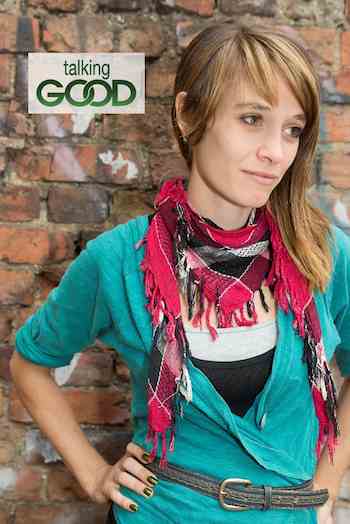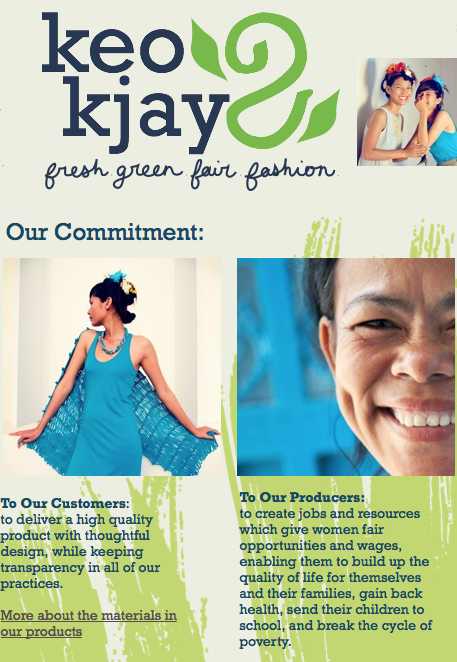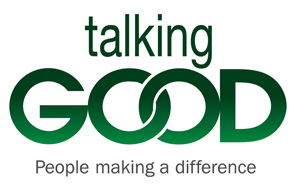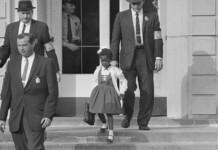 Upon graduating from Baltimore’s Maryland Institute College of Art with a degree in Fibers, 21-year-old Rachel Faller took the road less traveled. By “less” I mean by virtually no one, and by “road,” I mean that she hopped on a plane, said goodbye to the comforts of American living, and launched a socially responsible fashion label in Phnom Penh, Cambodia.
Upon graduating from Baltimore’s Maryland Institute College of Art with a degree in Fibers, 21-year-old Rachel Faller took the road less traveled. By “less” I mean by virtually no one, and by “road,” I mean that she hopped on a plane, said goodbye to the comforts of American living, and launched a socially responsible fashion label in Phnom Penh, Cambodia.
There were clearly some twists and turns along the way, but that is essentially what Rachel, now 26 years of age, accomplished on her own; it’s the path she continues to walk today. Guided by her passion for social justice and a desire to make a difference in her community, Rachel parlayed her knowledge of textiles and art to create KeoK’jay, an innovative fashion label, integrating social and environmental responsibility with contemporary design.
These days, being called a “socially responsible” enterprise is a badge of honor. But let’s face it, there are socially responsible enterprises, and then there are socially responsible enterprises! KeoK’jay, which means “bright green”, carefully considers every aspect of the business with the customer, the producer, and the environment in mind, from design, to materials, to production and packaging. According to Rachel: “In order for responsible production to take root, it needs to be shown to be profitable without aid subsidies.” KeoK’jay is (in some ways) a traditional, sales-supported business that can compete in the international fashion scene, but without all the labor violations and environment trashing.
In just a few years, Rachel has built KeoK’jay into a developed brand with two retail shops in Cambodia and international distribution. She wears many hats at KeoK’jay, from management and design, to merchandizing and business development. Most impressively, in my opinion, is how Rachel managed to accomplish all of this while staying true to her values and the communities she serves. Thanks for inspiring us Rachel and for answering the Talking GOOD questions.
 1. IN JUST ONE SENTENCE, WHAT IS YOUR PURPOSE IN LIFE? Be kind.
1. IN JUST ONE SENTENCE, WHAT IS YOUR PURPOSE IN LIFE? Be kind.
2. HOW HAS THIS WORK CHANGED YOU? One of the biggest things I have learned is that receiving is actually as important, if not more important, than giving. Being the receiver is sometimes much more difficult. It can be humbling; it reminds us we are human, that we have weaknesses and needs. We have to see ourselves as vulnerable; we have to be open to be open-minded. When we enter a situation seeing what we have to learn or gain, rather than what we have to teach or give, often times we have a much bigger impact on the community we wish to help. Humility touches people’s hearts, which motivates them to change things for themselves, in the long run making the much bigger and sustainable change that we seek. I’ve found time and time again that what I thought was needed by some community turned out to be not as I initially thought and something else entirely was needed. The only way we can sort through this, especially in the “giving” sector, is to first research, learn, listen, and get, and then to talk, teach, and give, or open up doors for people to do so.
3. WHAT DO YOU GET FROM GIVING? Everything.
4. WHO IS A LIVING HERO AND WHAT WOULD YOU ASK THEM IF GIVEN THE CHANCE? I have to say that some of my biggest heroes are my staff, and other people around the world who are making changes in their communities without any recognition. The ones who are standing up and doing something about the problems facing themselves and their families. The impact of these grass roots activists will change the problems faced by the communities in which we work more than we can imagine. Thus I feel really lucky that every day I get to work with and speak with my heroes!
5. WHAT EVERYDAY RESOURCES COULD HELP YOU ACHIEVE YOUR PHILANTHROPIC GOALS? I know you want me to tell you the one THING that we really need, but our biggest needs are always in human capacity. All of the “stuff” that we need is easily sorted out when we have the right people in place to manage, find, purchase, or organize the stuff. So finding, training and building a solid management team is our most important priority. As much as possible we want that team to be Cambodian, but there’s also room for dedicated professionals from other countries who have relevant skills to our work.
6. WHAT IS A BURNING QUESTION THAT YOU HAVE FOR THIS COMMUNITY? I’d love to ask your readers what they love to do most. How can you take this and use it to benefit yourself and your community?
7. WHAT WOULD THE TITLE OF YOUR BOOK BE? I’ve always wanted to write a satirical graphic novel called “Adventures in NGO Land” (Cambodia’s got the highest number of non-profit organizations per capita in the world, yet sadly sometimes they do more harm then good…)
8. TELL US SOMETHING YOU RARELY SHARE IN PUBLIC? Living in Cambodia has caused me to start enjoying really bad television. When dealing with intense experiences in my daily work, the last thing I want to do when I come home is watch a documentary that I have to think about, which I used to really enjoy.
9. WHAT ADVICE DO YOU HAVE FOR OTHERS WHO ASPIRE TO BE CITIZEN PHILANTHROPISTS? Figure out what you love to do most, and what inspires you most, and then go out and do that, while keeping an open minded and respectful perspective with the people around you. I believe this is the best way to do good and make an impact; as well as to avoid becoming either burned out or jaded. You have to love what you do and know that you are doing what’s best for yourself while doing good for others. Otherwise it is not sustainable, and it doesn’t really help anyone in the long run either.
10. WHAT IS YOUR FAVORITE INSPIRATIONAL SAYING? “Don’t ask yourself what the world needs. Ask yourself what makes you come alive and then go do that. Because what the world needs is people who have come alive.” (Howard Thurman)
 Talking GOOD is an ever-growing collection of interviews with purpose-driven individuals who champion causes and lead by example. These people are “citizen-philanthropists” because they prove that one does not need money – just passion, energy, and dedication to make a difference. Talking GOOD was launched in 2012 by Rich Polt, principal of the Baltimore-based PR consultancy, Communicate Good, LLC. See the entire archive of interviews here. To nominate someone for a Talking GOOD spotlight, please fill out this form, or email rich@communicategood.com.
Talking GOOD is an ever-growing collection of interviews with purpose-driven individuals who champion causes and lead by example. These people are “citizen-philanthropists” because they prove that one does not need money – just passion, energy, and dedication to make a difference. Talking GOOD was launched in 2012 by Rich Polt, principal of the Baltimore-based PR consultancy, Communicate Good, LLC. See the entire archive of interviews here. To nominate someone for a Talking GOOD spotlight, please fill out this form, or email rich@communicategood.com.



















